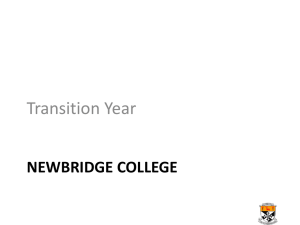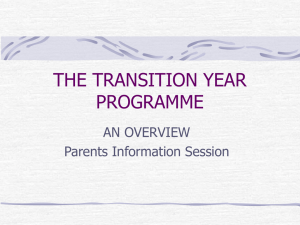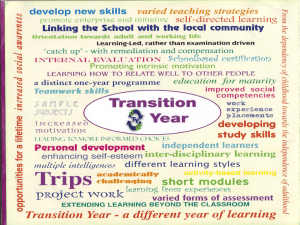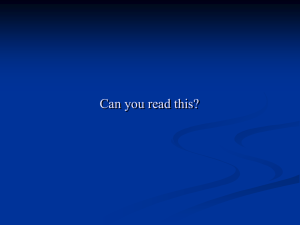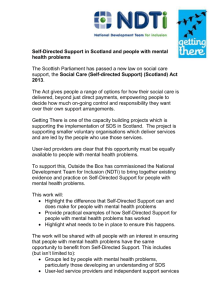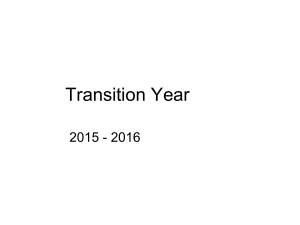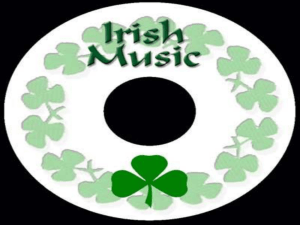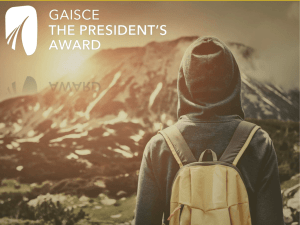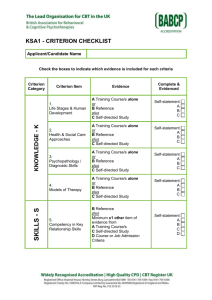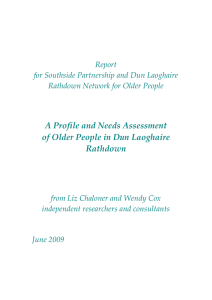presentation - Holy Child School, Killiney
advertisement
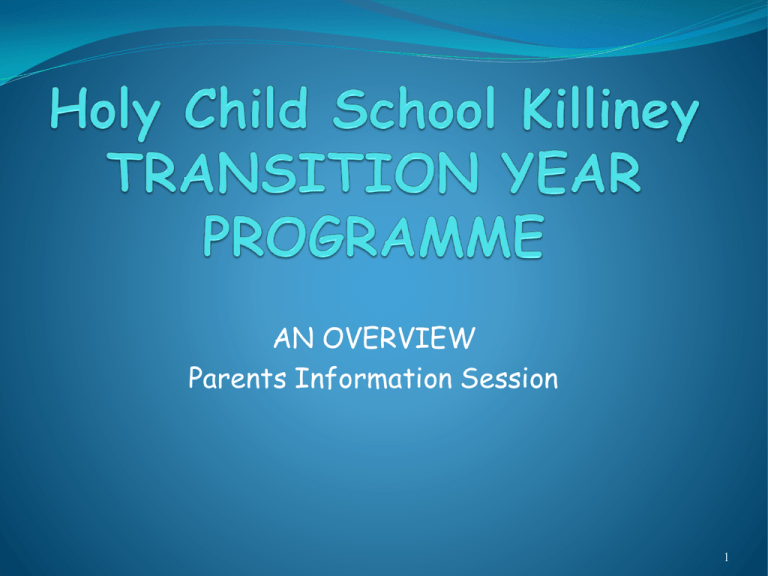
AN OVERVIEW Parents Information Session 1 TRANSITION YEAR Transition Year is a one year school based programme between Junior and Senior Cycle . It is designed to act as a bridge between the two by facilitating the smooth transition from the more dependant learning of the Junior Cycle to the more independent self-directed learning required for the Senior Cycle 2 Aims Education for MATURITY with emphasis on social awareness & increased social competence Education through experience of ADULT & WORKING LIFE as a basis for personal development & maturity Promotion of general, technical and academic SKILLS with an emphasis on interdisciplinary and self-directed learning Challenges Facing Young People The Leaving Certificate & Points Race Third Level Education Adult and Working life . 5 Challenges facing young people Leaving Certificate •Informed subject choice •Study Skills •Independent self-directed study skills •Assessment/Self assessment •CAO choices/course requirements Challenges facing young people Third Level •High drop our rate/dependency culture •Age profile/maturity •Self management skills •Time management skills •Study skills – independent self-directed •Group/Project work/Research skills •ICT skills Challenges Facing young people Adult working life •Self esteem •Relationships •Teamwork •Maturity •Careers/Work experience •Interviews – C.V. Portfolio •ICT skills •Certification – DES/School/Agencies Irish Times 3/05/10 Sean Flynn quoted from a research paper called Parental involvement in Post Primary Education by Dr. Delma Byrne and Dr.Emer Smyth of the ERSI. -There is strong parental approval for Transition Year but highlights the need to forge stronger links between schools and parents -The survey indicates that parents want less emphasis on academic disciplines and greater focus on life skills. -There is strong support for computer and other practical skills -There is a belief that the narrow curriculum does not prepare students for actually leaving school and going into the real world. Peeling the layers of a TY Programme 1. ‘Core’ Subject Layer 1. Subject Sampling Layer 3. Transition Specific Layer 4. Calendar Layer Core Subject Layer •English •Irish •Maths •SPHE •French •RE •PE •IT SKILLS •Spanish/German Subject Sampling Layer History Physics Biology Music Classical Studies Business Geography Chemistry Arts and Crafts Chinese Philosophy Economics Transition Specific Layer Musical First aid Log on Learn Cookery Driving/Steer Clear First Aid Young Social Innovators Social/Cultural Debating/Public Speaking Pottery Outdoor pursuits Speakers Community outreach Young Scientist Mini Company Mini-Company and certificate from the Marketing Institute Calendar Layer •Work Experience placement •Field trips (Significant learning day) •Community Care •School Musical •Gaisce •Adventure trip Hospital Work experience Mater Misericordiae University Hospital Contact : Ms Sandra Crawford IHL Co-ordinator Training, Education and Development Telephone: 8032000 St.Columcille’s Hospital, Loughlinstown. ( applications accepted only in September, places assigned in the first week of October) Contact: Ms.Deirdre Fitzgerald Chairperson Allied Health Professionals Department of Speech and Language Therapy St.Columcille’s Hospital Loughlinstown Co.Dublin Applications should be made in writing by the student, stating her particular area of interest and include a one page CV St. Michaels Hospital Dun Laoghaire Ms Nicola Geoghegan, PA to the General Manager and TY Programme co-ordinator General Managers Office, Lower Georges St, Dun Laoghaire PH: 2806901 Significant learning day Members of staff have TY students for an entire day and provide opportunities for significant learning experiences. •W5 9Belfast ( Science Department) •Work Experience ( Career Guidance Department) •Retreat ( RE department) •French Day •Self defence (level one) • Preparing for Christmas ( HE and Arts and Crafts) •Geography field trip •Pal 4 challenge areas are: 1. Community Involvement – 13 weeks 2. Personal Skill – 13 weeks 3. Physical Recreation – 13 weeks 4. Adventure Journey- Plan, prepare and undertake a 2 day, 1 night adventure journey in a group covering a minimum total distance of: Walking 25 – 35 km or Cycling 100 – 130 km over 2 consecutive days Term out of school Language Courses Application form is in your pack One term in advance / one months notice at the latest Marked in as a school activity therefore it will not be recorded as absent on the file. Keeping up with assignments while away Report sent to the school – will be retained on the students file Methodologies •Active and learner-focused •Teacher as facilitator •Collaborative and independent environment •Group work/Pair work •Role-play/simulations •Project work/Fieldwork •Out of school activities •Visiting speakers •Negotiated learning •Practical work Assessment ‘Assessment should be an integral part of the learning process in Transition Year not separate from it’. DES Guidelines •Folder of Excellence (Assessed throughout the year) •Oral/Aural assessment •Project work/assignments ( dates) •Self-assessment •Written/Practical Class test •Assessments at the end of each module •Written report on Work Experience/Community Care •Skills assessment •Examinations in core subjects at Christmas and end of year Parent/Teacher meeting Reports home Opportunities for certification School Certified IT skills programme First Aid Driving Steer clear Level one Self defence Public Access to law Homework The following activities may be described as homework: •Assignments set by teachers on a regular basis – Maths, Irish, English etc •Research Tasks – Internet (researching for projects, debates, homework assignments) •Participating in a sport, taking up a new skill(Gaisce) •Completing all sections of the Gaisce programme •Maintaining and completing the folder of excellence. Evaluation Encouraged as a regular feature External - The Inspectorate Internal – School - Whole School - Individual Subject Teacher - Students - Parents -Work providers Does Transition Year make a difference ? Research NCCA study (1994-1997) Those participating in TY are: More likely to be educationally adventurous. Scored 46 points higher on CAO. The TY programme/Assessment ESRI 2004 Those participating in TY: Scored two grade points higher in the Leaving Certificate. Students do better if Transition Year is an option. Some reflections on TY Stamina – Don’t be a great starter and a poor finisher Free classes – No such thing ! Community Service – what is its purpose? Work experience Freedom !! Or ?? Irish Times 4/04/10 Kate Holmquist quotes Dr.Keith Holmes Child psychiatrist: In Transition Year he says ‘Young people are being set back and deprived of the chance to adjust gradually to adulthood.....it should be a gradual process of growing freedom’. He cautions us against giving too much freedom too quickly.
